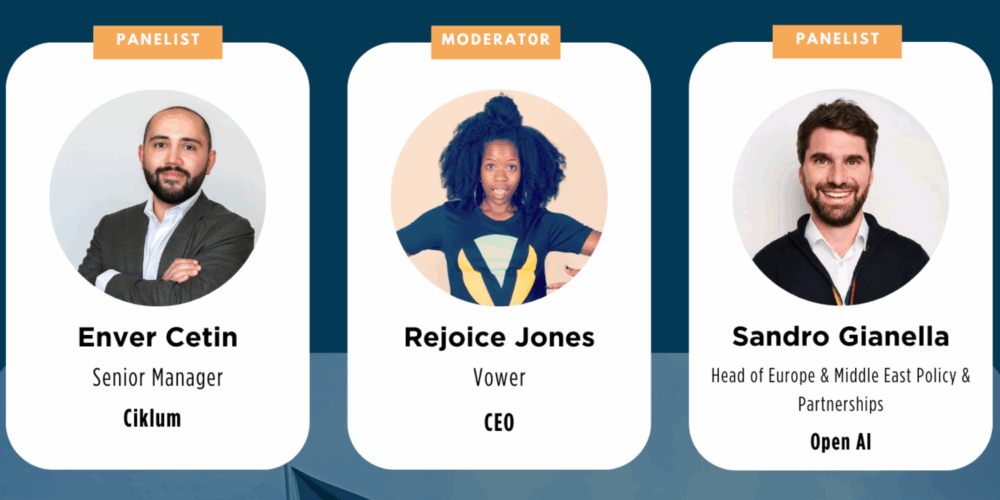AI as a Democratizing Force?

In July, Atlantik-Brücke alumni hosted a webinar on the rapid growth of artificial intelligence (AI) on both sides of the Atlantic. Rejoice Jones, founder and CEO of Vower and New Bridge Program alumna, moderated the panel, which featured fellow New Bridge alumnus Enver Cetin, Senior Manager of AI at Ciklum, and Young Leaders Alumnus Sandro Gianella, Head of Europe and Middle East Policy at OpenAI.
By Alexandra McGee, edited by Pia Kauer
During the 60-minute conversation, the panel tackled many different issues concerning AI, including coordination on a transatlantic policy on responsible AI, the need for workforce development to ensure this technology doesn’t widen the “digital divide,” as well as the power of democratizing information and ideas in a fast-paced modern world.
When asked about the impact of AI in general, our speakers cited numerous advantages like its ability to speed up learning in a dramatic fashion in any domain, such as guiding users without any formal training in software development through the process of coding. They highlighted that AI could provide access to capabilities for people who previously couldn’t afford them and pointed out how it could save users time that’s better spent on relationship building, creativity, and – importantly – even rest.
Together, the panel explored the complex challenges involved in achieving unified AI governance. Although collaboration between leading AI labs and policymakers is already showing signs of alignment, geopolitical obstacles remain. The growing power of AI systems raises critical issues, particularly with regard to their potential military applications.
Ultimately, everyone wants AI systems that are safe, transparent, and beneficial
Ultimately, everyone wants AI systems that are safe, transparent, and beneficial, our panelists claimed – so why not create common safety benchmarks that allow a wide range of different applications?
The societal implication of AI was front and center of our discussion. One panelist stressed the urge for proactive policies that support people who lack digital skills. They referred to an initiative by ChatGPT that allows users to talk to the AI using a land line, which might appeal to the less tech-savy and thereby remove access barriers to the new technology.
The panel went on to discuss the fear of job displacement caused by the rise of AI, drawing historical parallels with the Industrial Revolution, which rendered many jobs obsolete but also created countless new ones. However, they also acknowledged the stark insecurity surrounding AI’s potential impact in the coming years and the fact that no institution can anticipate the myriad possible futures and prepare society for them. Proposals such as a universal basic income were discussed, after which the audience pitched in with critical questions including about the environmental impacts of AI data warehouses and comments emphasising the importance of ensuring that communities are not left behind in this fast-paced transition.
One audience member cited an MIT study showing that frequent ChatGPT users experience a reduction in neural activity and memory decline, and voiced concerns over the regression of critical thinking capacities. Our speakers admitted that AI has the potential to turn us into ‘passive users’, but argued that it can also be used to aid critical thinking skills, for example by actively engaging with content and refining answers rather than blindly copying and pasting them. They also highlighted collaborations between AI companies and universities that address this issue.
In conclusion, the panelists all spoke with excitement about this technology being a democratizing force, creating additional access to skills for folks who might otherwise be left out of the digital transition to the Age of Ideas.
About the panelists:
Rejoice Jones is the Founder and CEO of Vower. As an entrepreneur with over 9 years of experience in building strategic partnerships to train underrepresented youth with the job skills necessary to work for tech companies on either side of the Atlantic, she is determined to understand if technology and culture can be the solution to institutional voids in the urban community. She took part in the New Bridge fellowship as part of the second US cohort in 2022.
Enver Cetin is a Senior Manager of AI at Ciklum where he deploys the latest technologies, including Generative AI. He leads strategic implementations, driving innovation and transforming business processes with AI solutions. He took part in the New Bridge fellowship as part of the second German cohort in 2024.
Sandro Gianella leads OpenAI’s Policy & Partnerships team across Europe, the Middle East and Central Asia. He’s previously built the EMEA Public Policy function at Stripe, worked on technology regulation at Google and the G7/G20 process as a lead analyst for the G20 Research Group and the Heinrich Böll Foundation. He was a Young Leaders Fellow in 2016.
Alexandra McGee is the Vice President of Strategic Initiatives at Marin Clean Energy (MCE). She was part of the sixth US cohort of the New Bridge Program 2023 and is the Chair of Marketing and Communications for the NBP Alumni Council.
